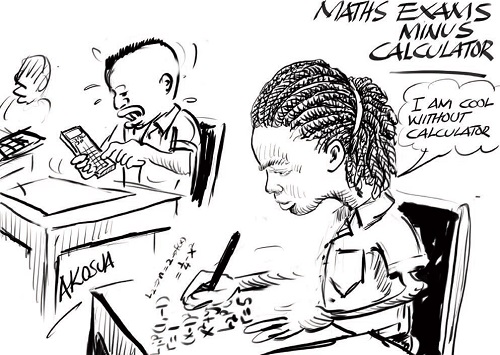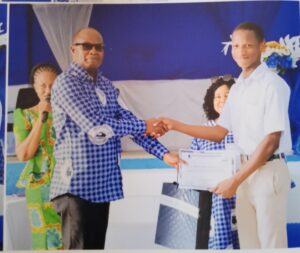
His chastisement was premised on the belief that Ghana’s pace of development could have been faster if the educational system had focused on the study of the sciences.
Given that the country set up the Kwame Nkrumah University of Science and Technology (KNUST), the focus quickly shifted to the humanities as many of the institutions of higher learning favoured the humanities.
The many interventions to help shift the focus and encourage young people to pursue mathematics and science courses include the National Science and Maths Quiz (NSMQ).
From what started as a simple conversation on a tennis court at the University of Ghana, Legon, the then Brilliant Maths and Science Quiz for senior high schools (SHS) started in 1993 and has metamorphosed into a huge national asset, christened the NSMQ.
Since then, the NSMQ has evolved yearly and today, we are celebrating 25 years of mentoring the nation’s great talents that will move the country to a different level. With the exception of 2010 and 2011 when the quiz was not held, this year’s edition will make the 23rd exciting edition of the contest.
The schools selected across the country are divided into the northern and southern sectors, with 16 schools per sector. Winners in both sectors are then brought to Accra for the grand finale.
Presently, the number of schools participating in the quiz is truly national in character, with over 130 schools pitching camp against one another for the enviable trophy and title as the NSMQ champions.
That simple idea from the then Managing Director of Primetime, Mr Kwaku Mensa-Bonsu, has helped in producing medical doctors, mathematicians, scientists, pharmacists, chemical engineers, aeronautic engineers, physicians among many other science-related professionals.
Progression
In 1997, the geographical sector system was abandoned and interestingly, two northern-sector schools (from the old format), Opoku Ware School and Prempeh College, made it to the finals where the Opoku Ware School won for the first time.
In 1998, the tournament became known as the NSMQ when it lost its sponsorship from Brilliant. Since 2000, the number of schools was increased to 40 and in 2013, the number of participating schools went up to 81, although 66 turned up for the competition.
Thus, the participation format was changed to three schools per contest, instead of two as had been the case since the event’s inception.
To make the programme truly national, the quiz has since 2014 involved 135 schools from all parts of the country.
Quiz mistresses
The first quiz mistress was the late Prof. Marian Ewurama Addy, a Professor of Biochemistry at the University of Ghana, Legon. She served as the inaugural quiz mistress from 1993 to 2000. She saw her role as an opportunity to inspire females to become scientists.
In recognition of her contribution to promoting the study of Science and Mathematics amongst girls through the NSMQ, Prof. Addy was named the Marketing Woman of the Year by the Chartered Institute of Marketing in 1995.
A botanist at the University of Ghana, Legon, Dr Eureka Emefa Adomako, took over as quiz mistress from 2001 to 2005, having been recommended by Prof. Addy.
Dr Adomako was a fantastic quiz mistress, who took charge of the programme until she had to leave for further studies. With her departure, Dr Adomako also recommended Dr Elsie Effah Kaufmann as quiz mistress.
In 2006, Dr Kaufmann, the Head of the Biomedical Engineering Department, University of Ghana, Legon, took over as the third quiz mistress. And over the past 10 years, she has succeeded in bringing her own style to the programme, occasionally injecting some humour into an otherwise formal programme.
As the chairperson of the moderation team, Dr Kaufmann is supported by a team of consultants made up of Prof. W. A. Asomaning, Dr Ebenezer Owusu, Dr Amos Kuditcher and Dr Douglas Adu-Gyamfi, all of the University of Ghana, Legon.
Winners
The Presbyterian Boys' Secondary School (PRESEC) in Accra has been to the finals seven times and won the trophy five times, while the Opoku Ware School, another seven-time finalist, has won the trophy twice.
Prempeh College is a four-time winner, while the Achimota School is the only unisex school to have won the competition. No female-only school has won the competition yet.
Only 11 schools out of the 475 SHSs in Ghana have won the competition since its inception.
Since 2012, the Ghana Education Service (GES), through the Conference of Heads of Assisted Schools (CHASS), took up the sponsorship of the programme. Thus, the competition was opened up to many more schools to participate.
In 2013, 66 out of the 81 invited schools participated in the quiz. In 2014, the number of schools was increased to 135 and in 2014, 108 schools were selected from regional competitions to join 27 seeded schools (quarter-finalists from the previous year's competition) at the national championships.
Innovations
As the contest clocks 25 years, organisers continue to introduce innovations into it. One of such is the introduction of the “money zone” into the competition, where contestants who progress to the quarter-final stage of the competition get entitled to a GH¢5 reward multiplied by the total number of points scored.
Progressively, contestants at the semi-final will earn GH¢10 per point while those at the final will earn GH¢15 per point.
The organisers have also introduced a “substitution system” where schools are allowed to make one substitution before the end of the “Problem of the Day” segment of the quiz. Read Full Story





















Facebook
Twitter
Pinterest
Instagram
Google+
YouTube
LinkedIn
RSS